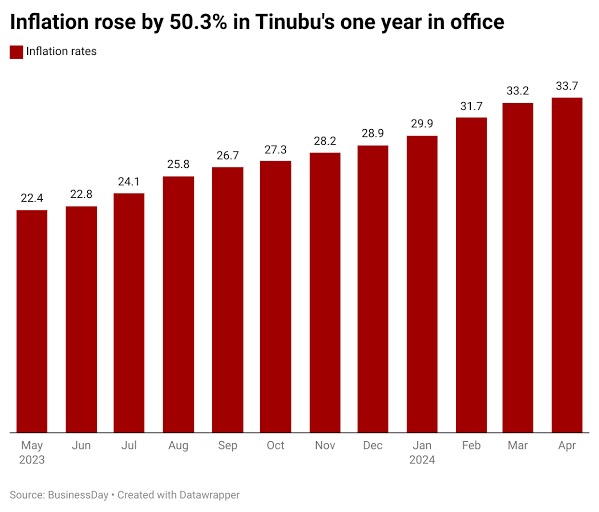By: Amadi Vincent Uzoma
Hunger has long tormented the world’s poverty capital, yet it has deteriorated since President Bola Tinubu got to work in May 2023.
Families are presently wrestling with the most horrendously terrible cost for most everyday items emergency in many years because of Tinubu’s striking however disliked financial changes.
The changes, which incorporate the petroleum and power subsidies, naira devaluation, and value-added tax on diesel imports have sent prices to a record high, pressed family spending plans, and caused the most terrible food emergency the nation has at any point experienced.
“The call of yearning the nation over is stronger than ever and it will keep on deteriorating on the grounds that the public authority is yet to resolve central issues hampering food creation,” Jude Obi, president of the Association of Organic Agriculture Practitioners of Nigeria said in response to questions.
“Weakness is as yet a significant issue and the Tinubu government has neglected to guarantee that the individuals who need to cultivate can complete their cultivating exercises with no type of dread,” he added.
As per Obi, the nation currently has a setback in all staples and this is basically liable for the ceaseless flood in food costs the nation over.

Nigeria is Africa’s most crowded country and the top cultivator of cassava, maize, cocoa, and beans. However, a developing number of Nigerians are attempting to eat day to day and falling into destitution as expansion speeds up and shrivels purchasing power, particularly for low and fixed-pay workers.
Around 93.8 million Nigerians or 46.9 percent of its 200 million individuals are living beneath the destitution line, and that number is assessed to rise this year, the World Bank said in the country’s advancement update report in June 2023.
Title expansion has taken off to its most noteworthy in thirty years hitting 33.2 percent in April, with the naira dropping to record lows, compelled by intense dollar deficiencies.
Nigeria imports food and fuel and was pounded by the flood in worldwide costs because of the Russian-Ukraine war.
A serious security emergency has collaborated with speeding up expansion and environmental change to drive food costs and yearning in Nigeria higher, with 26.5 million individuals the nation over projected to confront intense craving in the June – August 2024 lean season, as per a World Food Program report.
This is a stunning increment from the 18.6 million individuals who were food-shaky toward the finish of 2023.
Essentially, a joint report by the Food and Agricultural Organization, World Food Program, and the United Nations recorded Nigeria among five different nations as the ‘hotspot of global hunger’ – where individuals are confronting horrendous degrees of yearning.
“Individuals are truly eager in the nation today attributable to the steady flood in food costs in the midst of low buying power and many are skipping dinners to make due,” Abiodun Olorundenro, activities director at AquaShoots Restricted said in a meeting Friday.
Regardless of this, the typical food costs of key staples across significant urban areas in the nation have flooded by over 15.7 percent since May 29 2023 when the President accepted office, making food expansion hit 40% in April 2024 from 24.82 percent in May the year before.
The cost of garri, a well-known staple food in Nigeria and generally devoured by low-pay families, has flooded by 233% in a year.
A BusinessDay study across significant business sectors shows that the typical cost of a 50kg pack of yellow garri has flooded from a normal of N18,000 in May 2023 to N60,000 in May 2024. Also, the 4-liter paint holder proportion of yellow garri now sells for a normal of N4,000 as against N1,200 sold in a similar period last year.

The cost of a major crate of new tomatoes, the most consumed vegetable in the nation, has flooded by 350%. A major bin of tomatoes currently sells for N120,000 as against N40,000 sold a year ago.
The President promised to deploy savings from petrol subsidy removal into the food system to revamp agriculture and grow its contribution to GDP in the long term.
Be that as it may, no significant improvement has occurred since Tinubu made the commitment, as indicated by industry players.
“The Tinubu organization has not done a lot of in farming despite the fact that we are encountering a food emergency,” Olorundenro said.
As per him, the organization’s arrangement for the area in the previous year didn’t address other sub-areas – animals, ranger service, and fishing and interests in research that are basic to achieving food security, making positions, and helping trade profit.
Likewise, the arrangement for the area did exclude nourishment regardless of the nation having the most noteworthy weight of lack of healthy sustenance in Africa and the second most noteworthy around the world, as per UNICEF.
For the year, it has been hard for Nigerians as the costs of all things have dramatically multiplied.
Nigerians are presently continually attempting to bear the cost of essential requirements and frantically looking for monetary help as expansion disintegrates family earnings.
The circumstance has kept on deteriorating starting from the start of the year with possibilities of more because of the nonstop speed increase in expansion.
“I couldn’t bear to eat appropriately again as food costs keep on flooding. When I can take care of my kids two times day to day I’m fulfilled,” Ronke Raji, a beautician at Ketu Market said.
“Individuals are attempting to reduce down on their expenses so they can endure the troublesome second. As a component of the expense measures, women are wearing hairpieces now as opposed to making their hair. This is removing position from us. Things being what they are, how might I bear the cost of a decent eating regimen for my kids or myself”? She inquired.
Moji Adeleke, an educator and a mother of four said, “I can’t bear to give my kids an egg each day any longer notwithstanding knowing the significance of their advancement since it has become so costly.”

































